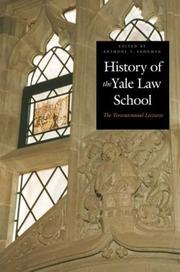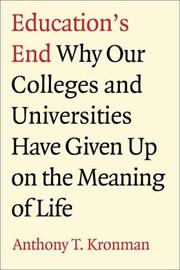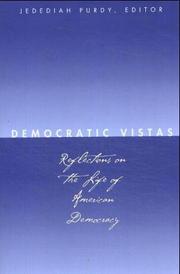| Listing 1 - 10 of 11 | << page >> |
Sort by
|
Book
ISBN: 0713163615 Year: 1983 Publisher: London Arnold
Abstract | Keywords | Export | Availability | Bookmark
 Loading...
Loading...Choose an application
- Reference Manager
- EndNote
- RefWorks (Direct export to RefWorks)
Sociology of law --- Legal theory and methods. Philosophy of law --- Weber, Max --- 340.11 --- 330.8 --- 321.01 WEBER, MAX --- Sociological jurisprudence --- 330.8 WEBER, MAx --- Law --- Law and society --- Society and law --- Jurisprudence --- Sociology --- Law and the social sciences --- Rechtstheorie. Rechtsvinding--(algemeen) --- Economisch denken. Economische scholen. Economische theorieen --- Algemene staatsleer. Politieke filosofie. Staatsleer. Staatstheorie--WEBER, MAX --- -ウェーバー --- Bibliography --- 321.01 WEBER, MAX Algemene staatsleer. Politieke filosofie. Staatsleer. Staatstheorie--WEBER, MAX --- 330.8 Economisch denken. Economische scholen. Economische theorieen --- 340.11 Rechtstheorie. Rechtsvinding--(algemeen) --- -Bibliography --- Weber, Max, --- Bibliography. --- ウェーバー, マックス --- Ma-kʻo-ssu Wei-po, --- Makesi Weibo, --- Pebŏ, --- Pebŏ, Maksŭ, --- Vēbā, Makkusu, --- Veber, Maks, --- Vemper, Max, --- Webŏ, Maksŭ, --- Wei-po, Ma-kʻo-ssu, --- Weibo, --- Weibo, Makesi, --- ובר, מאקס, --- ובר, מאכס --- ובר, מקס --- 韦伯,

ISBN: 1281729116 9786611729110 0300128762 9780300128765 9781281729118 0300095643 9780300095647 6611729119 Year: 2004 Publisher: New Haven Yale university press
Abstract | Keywords | Export | Availability | Bookmark
 Loading...
Loading...Choose an application
- Reference Manager
- EndNote
- RefWorks (Direct export to RefWorks)
The entity that became the Yale Law School started life early in the nineteenth century as a proprietary school, operated as a sideline by a couple of New Haven lawyers. The New Haven school affiliated with Yale in the 1820's, but it remained so frail that in 1845 and again in 1869 the University seriously considered closing it down. From these humble origins, the Yale Law School went on to become the most influential of American law schools. In the later nineteenth century the School instigated the multidisciplinary approach to law that has subsequently won nearly universal acceptance. In the 1930's the Yale Law School became the center of the jurisprudential movement known as legal realism, which has ever since shaped American law. In the second half of the twentieth century Yale brought the study of constitutional and international law to prominence, overcoming the emphasis on private law that had dominated American law schools. By the end of the twentieth century, Yale was widely acknowledged as the nation's leading law school. The essays in this collection trace these notable developments. They originated as a lecture series convened to commemorate the tercentenary of Yale University. A distinguished group of scholars assembled to explore the history of the School from the earliest days down to modern times. This volume preserves the highly readable format of the original lectures, supported with full scholarly citations.Contributors to this volume are Robert W. Gordon, Laura Kalman, John H. Langbein, Gaddis Smith, and Robert Stevens, with an introduction by Anthony T. Kronman.
Law --- Acts, Legislative --- Enactments, Legislative --- Laws (Statutes) --- Legislative acts --- Legislative enactments --- Jurisprudence --- Legislation --- Study and teaching --- History. --- Yale Law School --- Yale School of Law --- Yale University. --- Study and teaching&delete& --- History

ISBN: 128172887X 9786611728878 0300138164 9780300138160 9780300122886 0300122888 9781281728876 Year: 2007 Publisher: New Haven
Abstract | Keywords | Export | Availability | Bookmark
 Loading...
Loading...Choose an application
- Reference Manager
- EndNote
- RefWorks (Direct export to RefWorks)
The question of what living is for-of what one should care about and why-is the most important question a person can ask. Yet under the influence of the modern research ideal, our colleges and universities have expelled this question from their classrooms, judging it unfit for organized study. In this eloquent and carefully considered book, Tony Kronman explores why this has happened and calls for the restoration of life's most important question to an honored place in higher education. The author contrasts an earlier era in American education, when the question of the meaning of life was at the center of instruction, with our own times, when this question has been largely abandoned by college and university teachers. In particular, teachers of the humanities, who once felt a special responsibility to guide their students in exploring the question of what living is for, have lost confidence in their authority to do so. And they have lost sight of the question itself in the blinding fog of political correctness that has dominated their disciplines for the past forty years. Yet Kronman sees a readiness for change--a longing among teachers as well as students to engage questions of ultimate meaning. He urges a revival of the humanities' lost tradition of studying the meaning of life through the careful but critical reading of great works of literary and philosophical imagination. And he offers here the charter document of that revival.
Humanities --- Life. --- Meaning (Philosophy) --- Philosophy --- Semantics (Philosophy) --- Life --- Study and teaching (Higher) --- Philosophy. --- Humanities -- Study and teaching (Higher) -- United States.. --- Life.. --- Meaning (Philosophy) -- Study and teaching (Higher) -- United States.. --- Humanities -- Philosophy. --- Humanities Study and teaching (Higher) --- Humanities United States --- United States --- Philosophical anthropology --- Higher education --- educating --- HO (hoger onderwijs) --- opvoeding --- United States of America
Book
ISBN: 0300224915 9780300224917 0300208537 9780300208535 Year: 2016 Publisher: New Haven London
Abstract | Keywords | Export | Availability | Bookmark
 Loading...
Loading...Choose an application
- Reference Manager
- EndNote
- RefWorks (Direct export to RefWorks)
In this passionate and searching book, Anthony Kronman offers a third way-beyond atheism and religion-to the God of the modern world "An astonishing, . . . epically ambitious book. . . . An intellectual adventure story based on the notion that ideas drive history, and that to dedicate yourself to them is to live a bigger, more intense life."-David Brooks, New York Times We live in an age of disenchantment. The number of self-professed "atheists" continues to grow. Yet many still feel an intense spiritual longing for a connection to what Aristotle called the "eternal and divine." For those who do, but demand a God that is compatible with their modern ideals, a new theology is required. This is what Anthony Kronman offers here, in a book that leads its readers away from the inscrutable Creator of the Abrahamic religions toward a God whose inexhaustible and everlasting presence is that of the world itself. Kronman defends an ancient conception of God, deepened and transformed by Christian belief-the born-again paganism on which modern science, art, and politics all vitally depend. Brilliantly surveying centuries of Western thought-from Plato to Augustine, Aquinas, and Kant, from Spinoza to Nietzsche, Darwin, and Freud-Kronman recovers and reclaims the God we need today.
Book
ISBN: 0300208537 9780300208535 Year: 2016 Publisher: New Haven Yale Univ Press
Abstract | Keywords | Export | Availability | Bookmark
 Loading...
Loading...Choose an application
- Reference Manager
- EndNote
- RefWorks (Direct export to RefWorks)
We live in an age of disenchantment. The number of self-professed “atheists” continues to grow. Yet many still feel an intense spiritual longing for a connection to what Aristotle called the “eternal and divine.” For those who do, but demand a God that is compatible with their modern ideals, a new theology is required. This is what Anthony Kronman offers here, in a book that leads its readers away from the inscrutable Creator of the Abrahamic religions toward a God whose inexhaustible and everlasting presence is that of the world itself. Kronman defends an ancient conception of God, deepened and transformed by Christian belief—the born-again paganism on which modern science, art, and politics all vitally depend. Brilliantly surveying centuries of Western thought—from Plato to Augustine, Aquinas, and Kant, from Spinoza to Nietzsche, Darwin, and Freud—Kronman recovers and reclaims the God we need today.
Book
ISBN: 0300265336 9780300265330 0300265336 Year: 2022 Publisher: New Haven Yale University Press
Abstract | Keywords | Export | Availability | Bookmark
 Loading...
Loading...Choose an application
- Reference Manager
- EndNote
- RefWorks (Direct export to RefWorks)
"Many people of faith continue to believe that the meaning of life depends on our connection to an eternal order of some kind. Atheists deride this belief as a childish superstition. It is true that we can never reach God, as religion promises. But we cannot give up the longing to do so either. We are condemned by our nature to set goals we can neither abandon nor fulfill, though paradoxically we are able to come closer if we try. The human condition is one of inevitable disappointment tempered by moments of joy. To explain how this defining human experience is even possible, we are compelled to assume that the world is inherently and infinitely divine. After Disbelief guides the reader to this unexpected conclusion. It delivers the God that every rational humanist needs. Neither religion, in the conventional sense, nor the atheism that has growing appeal today, fits the facts of the human condition. This book does. Resolutely humanistic and theologically inspired at once, it offers a rational path to the love of God amidst the disenchantments of our time"--
God --- Spiritual life --- Belief and doubt
Book
ISBN: 0674539265 Year: 1993 Publisher: Cambridge, Mass. Belknap Press of Harvard University Press
Abstract | Keywords | Export | Availability | Bookmark
 Loading...
Loading...Choose an application
- Reference Manager
- EndNote
- RefWorks (Direct export to RefWorks)

ISBN: 1281730645 9786611730642 0300130481 9780300130485 9781281730640 0300102569 9780300102567 Year: 2004 Publisher: New Haven Yale University Press
Abstract | Keywords | Export | Availability | Bookmark
 Loading...
Loading...Choose an application
- Reference Manager
- EndNote
- RefWorks (Direct export to RefWorks)
In this thought-provoking collection, leading scholars explore democracy in the United States from a sweeping variety of perspectives. A dozen contributors consider the nature and prospects of democracy as it relates to the American experience-free markets, religion, family life, the Cold War, higher education, and more. These probing essays bring American democracy into fresh focus, complete with its idealism, its moral greatness, its disappointments, and its contradictions. Based on DeVane lectures delivered at Yale University, these writings examine large themes and ask important questions: Why do democratic societies, and the United States in particular, tolerate profound economic inequality? Has the United States ever been truly democratic? How has democratic aspiration influenced the development of practices as diverse as education, religious worship, and family life? With deep insights and lively discussion, the authors expand our understanding of what democracy has meant in the past, how it functions now, and what its course may be in the future.
Book
Abstract | Keywords | Export | Availability | Bookmark
 Loading...
Loading...Choose an application
- Reference Manager
- EndNote
- RefWorks (Direct export to RefWorks)
Book
Year: 1979 Publisher: Boston (Mass.) : Little, Brown,
Abstract | Keywords | Export | Availability | Bookmark
 Loading...
Loading...Choose an application
- Reference Manager
- EndNote
- RefWorks (Direct export to RefWorks)
| Listing 1 - 10 of 11 | << page >> |
Sort by
|

 Search
Search Feedback
Feedback About UniCat
About UniCat  Help
Help News
News